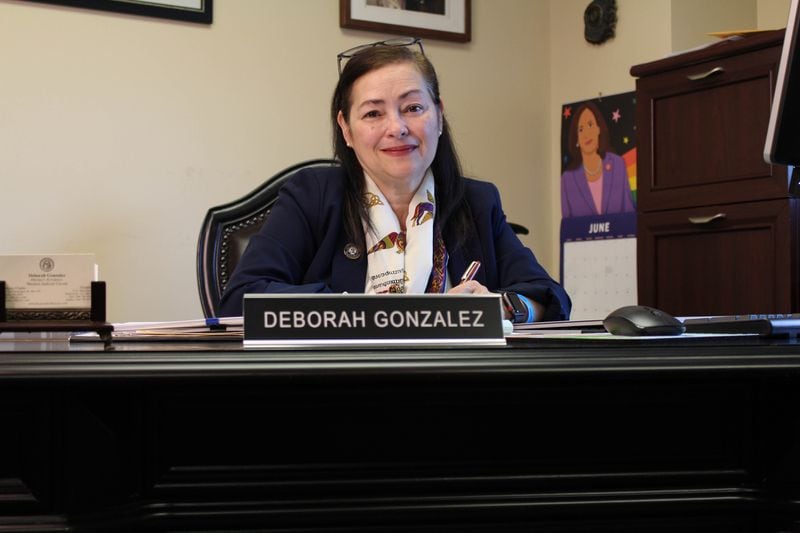The Georgia Supreme Court is set to determine whether district attorneys and their offices can be sued under the state’s Open Records Act.
The court granted review in a case challenging the response to 102 requests for information submitted to Western Judicial Circuit District Attorney Deborah Gonzalez, the embattled chief prosecutor in Athens-Clarke and Oconee counties.
Gonzalez, who has come under fire in part for her refusal to prosecute low-level drug crime, asked the state Supreme Court to toss a lawsuit brought against her by constituent Jarrod Miller. A senior trial judge allowed Miller’s suit to proceed in November.
Miller sought in June to compel Gonzalez to produce a raft of records demanded months earlier by Kevin Epps, Miller’s attorney. Epps, who also represents Miller in a separate lawsuit alleging Gonzalez is failing to do her job, lodged more than 100 requests for information under Georgia’s Open Records Act between February and April, case records show.
Gonzalez, in office since January 2021, said she complied with the Act in responding to Epps’s various requests, contained within 34 different letters. In addition, the Act does not apply to district attorneys, she said.
Credit: File photo
Credit: File photo
“As constitutional officers created as part of the judicial branch, district attorneys – like the rest of the judicial branch – are not, and were never intended to be, subject to the Open Records Act,” Gonzalez told the state Supreme Court in her application for review.
She said district attorneys have immunity under the Georgia Constitution from lawsuits arising from the performance of their duties.
The state Supreme Court said in a Dec. 27 order that it is particularly concerned with whether that constitutional immunity bars enforcement actions brought against district attorneys under the Open Records Act. It is also focused on whether the Act applies to district attorneys’ offices.
Oral arguments in the case have yet to be scheduled.
The District Attorneys’ Association of Georgia asked the state Supreme Court to find that district attorneys are members of the judicial branch of government, and to uphold the “unique immunity” protecting prosecutors under the Georgia Constitution. The association did not take a position on whether the Open Records Act applies to district attorneys’ offices.
The information Epps sought from Gonzalez included records related to the function of her office. Miller said in his June complaint that he wants records “that expose the breadth of the district attorney’s office’s failures, including but not limited to unprecedented staff shortages, staggering caseloads, violations of crime victims’ rights, failure to serve the interests of the public to effectively prosecute criminal cases, and an open disregard for the laws of the state of Georgia.”
Gonzalez argued that Miller isn’t able to sue over someone else’s Open Records Act requests. She urged the state Supreme Court to “prevent unnecessary diversion and distraction” from her duties “in needlessly defending against claims that are completely barred and prohibited by law.”
Gonzalez was a main target of the state legislature’s attempt to create a prosecutorial oversight commission to investigate and discipline district attorneys and solicitors general for alleged job-related failures. The agency failed to get off the ground as the state Supreme Court refused to approve its rules and regulations.
A revised effort to establish a prosecutor watchdog – aimed at those who won’t bring cases over minor marijuana possession and abortion, among other things – is expected to come in the state’s upcoming legislative session starting Jan. 8.
Fulton County District Attorney Fani T. Willis was the subject of the first complaint to the now scuttled commission, following her prosecution of former President Donald Trump and his allies accused of unlawfully interfering in Georgia’s November 2020 general election.
When signing the commission’s supporting legislation in May, Gov. Brian Kemp heralded the measure to sanction “rogue prosecutors” seen by Republican state leaders as being soft on crime. He repeatedly rejected the notion that Willis should be punished by the commission over her indictment of Trump and 18 others.
Gonzalez is the first female and first minority district attorney in her judicial circuit, the only Latina district attorney in Georgia, and the first female Puerto Rican district attorney in the United States, according to her office’s website. She is a former Democratic member of the Georgia General Assembly, having served two years as a state representative.
About the Author








/cloudfront-us-east-1.images.arcpublishing.com/ajc/FTAF5ZMCDZD5ZJ5SZ2U3Z5O2VI.JPG)